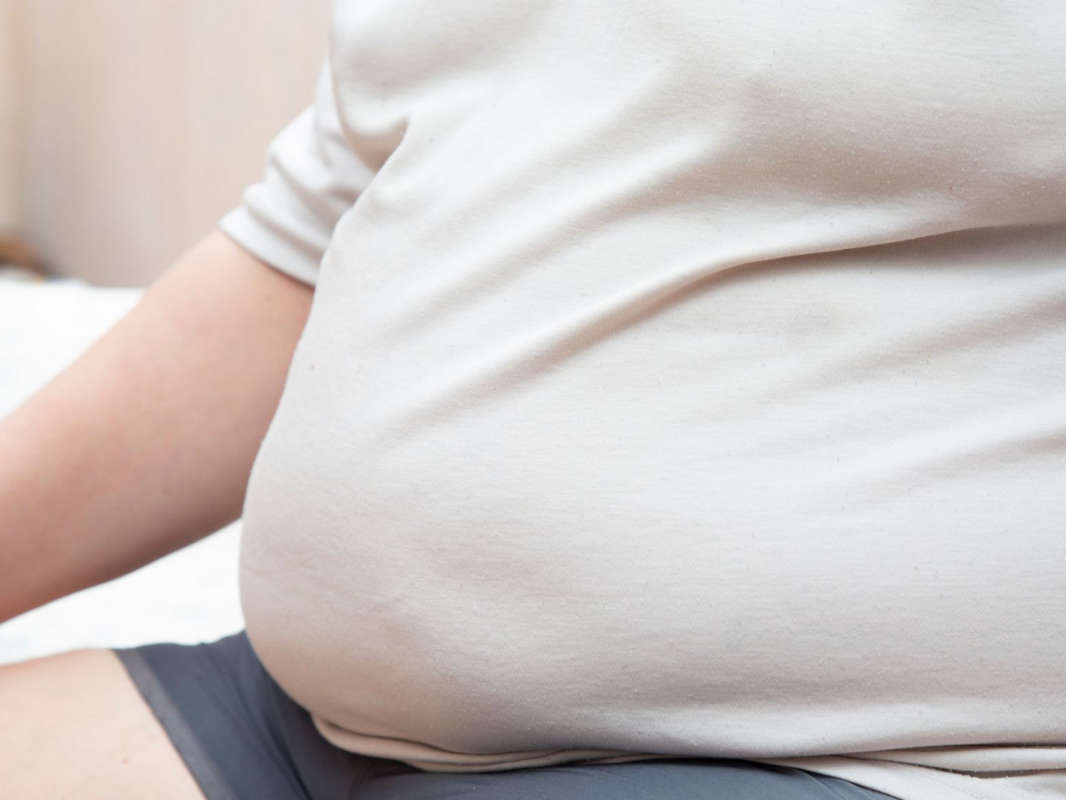
A new study has found lucky fat genes can help protect obese people from certain diseases.
While anyone with a body mass index (BMI) over 30 is considered obese, two people with the same BMI can have very different amounts of fat, and that fat can be distributed in different places throughout the body.
Fat stored under the skin, like a paunch or a double chin, is considered less harmful than fat stored around organs such as the liver and heart.
And according to researchers, the genes people are born with determine how and where this fat is stored.
Those with the lucky genes tend to have their fat stored under the skin rather than on their organs - reducing the risk of some diseases.
Anyone with a body mass index (BMI) over 30 is considered obese.
But two people with the same BMI can have very different amounts of fat, and that fat can be distributed in different places throughout the body.
Scientists say the study's findings could explain why some obese people remain relatively healthy, while others suffer from life-changing conditions such as heart disease.
Lead researcher from Brunel University London, Dr Hanieh Yaghootkar said:
"Some people have unlucky fat genes, meaning they store higher levels of fat everywhere, including under the skin, liver, and pancreas.
"That's associated with a higher risk of diseases such as type 2 diabetes.
"Others are luckier and have genes that mean higher fat under the skin but lower liver fat and a lower risk of diseases like type 2 diabetes."
As part of the study, 37 diseases were tested. A total of 12 of those, including coronary artery disease and stroke, were found to be directly related to the genes which determine where the fat is stored.
Nine of the conditions were found to be unrelated to where a person's fat is stored and instead were most likely a result of simply carrying too much weight. These included deep vein thrombosis and arthritic knees.
People still urged to consider obesity as a hazard to their health
However, researchers continue to warn people that being obese is still a serious health hazard - regardless of fat storage location.
It is hoped the study will help doctors to determine if they should be targeting the adverse effects of someone's obesity, or be trying to get them to shed a few pounds.
Professor of human genetics at the University of Exeter, Timothy Frayling said:
"For example, there are many treatments that can lower the high-fat levels in the blood and around the organs that do not affect the extra weight a person carries.
"In contrast, for other conditions, it may be more important to reduce the extra weight as much as, or more than, the damaging high sugar and fat levels in the blood."
The study, published in the journal eLife collected information from 500,000 individuals aged 37 to 73 between 2006 and 2010 from across the UK.

 More 'Live' Bus Information Screens To Be Installed In West Sussex
More 'Live' Bus Information Screens To Be Installed In West Sussex
 Rare Bee Found In Lewes
Rare Bee Found In Lewes
 Event Bookings Go Live For Worthing Festival ‘24
Event Bookings Go Live For Worthing Festival ‘24
 Man Charged After Throwing Brick Through Brighton Restaurant Window
Man Charged After Throwing Brick Through Brighton Restaurant Window
 Peacehaven Man Disqualified Over High-Speed A27 Pursuit Near Brighton
Peacehaven Man Disqualified Over High-Speed A27 Pursuit Near Brighton
 Appeal After PCSO Assaulted In Uckfield
Appeal After PCSO Assaulted In Uckfield
 Man Charged With Rape Of Teenage Girl In Newhaven
Man Charged With Rape Of Teenage Girl In Newhaven
 Overnight Closures For A22 Forest Row Road Improvements
Overnight Closures For A22 Forest Row Road Improvements
 Brighton Defence Manufacturer's Controversial Planning Application Likely To Be Heard
Brighton Defence Manufacturer's Controversial Planning Application Likely To Be Heard
 Over £2.4m Approved For Worthing School Support Centre
Over £2.4m Approved For Worthing School Support Centre